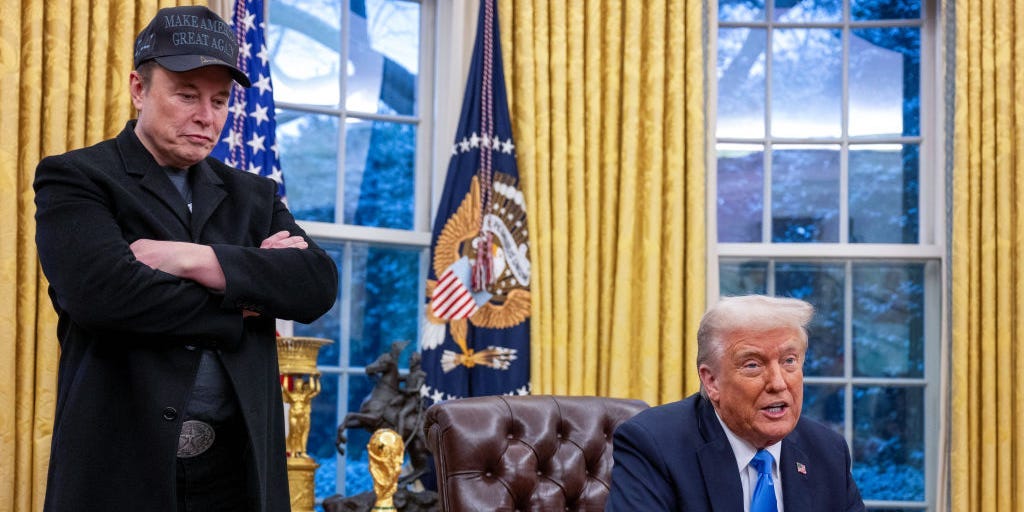- Trump’s government cuts are impacting military veterans, causing job losses and uncertainty.
- Military veterans make up 30% of the federal workforce.
- Military veteran employees fear further cuts, especially those with disabilities.
Military veterans say they’re feeling a mix of confusion, desperation, and fear about sweeping cuts to the federal government.
One disabled veteran who was laid off this month from the US Department of Agriculture said she’s making ends meet with a disability stipend. She worries the Veterans Affairs benefit could be cut, too. Her husband is unemployed while he is pursuing a specialized military job.
“It’s just a really hard situation to be in,” she told Business Insider.
Another veteran said that her recent layoff from another section of the USDA crushed her dream of a lifetime of public service. “I was really excited to be a federal employee,” she told BI. “I wanted to be a civil servant.”
These former servicemembers and three others spoke to BI on the condition of anonymity to protect their current jobs or to avoid career reprisals should they seek government work in the future. BI has verified their identities.
President Donald Trump’s Department of Government Efficiency, an operation led by Elon Musk, has laid off thousands of government workers in the last several weeks. The cuts may be disproportionately impacting veterans.
According to the US Office of Personnel Management, military veterans made up about 30% of federal employees in 2021, and many of those had service-related disabilities.
“It’s a middle finger to our heroes and the law and their lives of service,” Sen. Tammy Duckworth told reporters during a press call Wednesday. The congresswoman is a retired Illinois Army National Guard lieutenant colonel who was left disabled after a rocket-propelled grenade hit her helicopter in Iraq.
Veterans have served “honorably, reliably, and with dignity,” the Democratic senator continued. “They do not deserve this treatment.”
‘I joined because I wanted to serve’
The veteran with dreams of lifelong public service was fired last week from her work as a soil tester for the USDA.
She’s worried her now-former employer, the Natural Resources Conservation Service, could be disbanded. The agency was created after the 1930s Dust Bowl era to halt further soil erosion and prevent another such catastrophe.
“Without soil, we don’t have crops; we don’t have stability for buildings,” the woman said.
Roughly 6% of the US population identify as veterans, according to the US Census. The federal government’s hiring process gives veterans who were discharged under honorable conditions priority over other job applicants.
Now those veteran employees are in the crosshairs as the DOGE commission slashes agencies — including USAID, the Department of Veterans Affairs, and likely soon the military — purging operations it considers a waste of government resources.
Musk hopes to cut at least $2 trillion in waste.
“Being in the military has really given me an appreciation for service,” the former USDA soil employee told BI. “I joined because I wanted to serve. When I went to the [Military Entrance Processing Station], I said, ‘I don’t care what job you put me in, whatever job you put me in is what my country needs me to do.'”
She said that her termination letter cited poor performance as the cause for separation.
However, employee performance review documents shared with Business Insider highlight the veteran’s performance as a reliable go-getter. Over the past week, employees throughout the government have cited performance-driven terminations that they maintain are disconnected from their performance reviews.
‘We don’t know who or what to believe’
Other agency staffers still unaffected by cuts are fearful of what may come and unsure of how to prepare.
One military veteran at the US Department of Commerce expressed concern for an older colleague, an Army veteran with 100% service-connected disability rating from the VA.
“We are worried that people with disabilities and/or reasonable accommodations will be targeted,” the Commerce employee, who asked for anonymity out of concern they could be targeted for speaking publicly, told BI in an email. Reasonable accommodations allow an employee with a disability to modify their hours, working space, or responsibilities.
Veterans Affairs leadership has said no reductions to benefits are planned, but several veterans said they fear that could change. According to a 2023 Bureau of Labor Statistics report, over 31% of employed veterans with a service-related disability worked in the public sector.
“Some days we hear that veteran’s preference will protect us, and other days we hear veterans [and veteran health benefits] could be targeted in a future wave of attacks,” they said, adding, “We don’t know who or what to believe.”
Others are concerned about the fate of disabled veterans in government roles. “People need to realize it’s hard for disabled veterans sometimes to get employment in the civilian sector,” said a third USDA probationary employee and disabled veteran who was fired last Thursday.
“They don’t get as much respect in the civilian sector as they do within the government,” she said.
The White House did not provide comment to BI on the impact of the ongoing cuts on the military veteran community.
‘Nobody knows what’s going on’
Another veteran who works in peer support at the Veteran Crisis Line told BI she knows of around a dozen colleagues on probationary status who were laid off.
She said she and her coworkers serve as a sort of bridge between emergency hotline responders and longer-term follow-on care, which can sometimes require dayslong waits for an appointment.
“Nobody knows what’s going on,” she said, calling the uncertainty “nerve-racking.”
Axing the probationary employees from the crisis line has tanked morale, she said.
“It’s a very hard job and not a lot of people can do it, or want to do it,” she said, adding that “it’s got a high burnout rate, so when you find people that are at the VCL and stay and want to stay, those are diamond-in-the-rough kind of people.”
“I do think that there is waste or places that they can cut,” she said of fat-trimming measures happening in the federal government. “But generally, it’s the administrative stuff at the top, not us.”
“Over here, we’re actually doing the work,” she added. “Some of those jobs we need … who’s going to pick up that slack?”
Sam Fellman and Alice Tecotzky contributed to this reporting.
Read the full article here
















